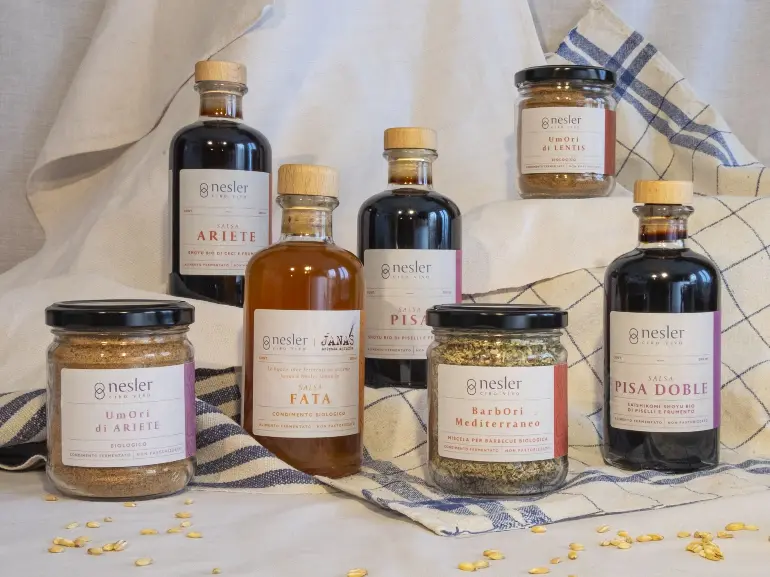Nesler Cibo Vivo
From the heart of Italy
Frequently asked questions
1. How should the product be stored?
The storage instructions of each product are written on the label. In general, a cool place is recommended, which corresponds to the normal conditions that can be in a home, excluding very high temperatures, such as there may be in summer. A temperature of 15-20 °C might be ideal, but storage in a refrigerator or cold cellar will also not harm the product.
2. How should I store the product after opening and how long will it keep?
After opening, the product can be stored under the same conditions as stated on the label, unless otherwise stated. Nesler products will normally keep at least until the best before date indicated on the label. This is the case even if they have been opened. Of course, this is only true if you follow the directions found on the label, such as “store in a cool place.”
3. Can I consume the product even after the best before date?
The best before date is the date by which the manufacturer guarantees the product's shelf life. In many cases, products can be consumed even after this date, but in this case it will be up to the consumer to ensure that the product is still unimpeachable. In the case of fermented condiments, it is found that they are often storable even much longer than the date indicated on the label, but this must be evaluated on a case-by-case basis and also depends on how they are stored.
4. Should I be concerned, if miso has leaked from the closed jar?
Spillage of miso or liquid from the jar can be considered normal, as is also indicated by the label on the cap. This spillage is due to the production of fermentation gas. Therefore, it is recommended, to prevent spillage, that the jars never be laid down or turned upside down. The caps used are designed specifically to allow gas or liquid to escape, but prevent anything from entering the jar until the jar is opened.
5. Is it normal for miso to swell once the jar is opened?
Yes, it is normal, because it may contain CO2 gas due to natural fermentation, which once the jar is opened, causes the volume of miso to grow a little bit. But it is also normal for this not to happen. A naturally fermented and unpasteurized product behaves this way, being alive.
6. Are Nesler products safe for anyone to consume or are there any contraindications?
We are not aware of any generic contraindications, other than the obvious ones related to specific ingredients, such as allergies, intolerances or requirements due to specific diets. In any case, dietary advice related to specific pathological or clinical conditions should be sought from the attending physician; we food professionals cannot give medical advice.
7. Are there any recommended doses for taking the products?
In general, we can only advise you to use common sense and your own taste. There is no one-size-fits-all advice, even considering that Nesler products are food products, not supplements or medicines.
8. How should Nesler fermented seasonings be used?
We believe that everyone can and should exercise their own creativity in cooking, according to their own taste. However, we have created a section on our website with suggestions for use and sample recipes (in Italian), it can be found at the link: /idee-e-ricette
9. The words "gluten-free" appear on some products, can I trust them?
The (Italian) law establishes the criteria for which the manufacturer can put the words "gluten-free" on the label, Nesler strictly adheres to these criteria. If the gluten content is no more than 20 mg/kg, the wording "gluten-free" is allowed. In the case of Nesler products in which ingredients with gluten appear, such as wheat, emmer, barley, etc., but the label says "gluten-free," this indicates that corresponding tests were done with values below the legal limit. If you wonder how this is possible, the answer is that certain fermentations, sufficiently protracted over time, are able to denature the gluten present.
10. Are Nesler products suitable for people with celiac disease?
Not all Nesler products are gluten-free. The products that are gluten-free, carry the wording on the label, the words "suitable for celiacs" being optional, we limit ourselves to the words "gluten-free" as per current regulations.
11. C'è un rischio di botulismo con i prodotti Nesler?
No, i prodotti Nesler sono tutti garantiti dal punto di vista della sicurezza alimentare. In particolare la tossina botulinica (prodotta da Clostridium botulinum) non può svilupparsi in presenza di una alta concentrazione di sale come nei condimenti fermentati Nesler Cibo Vivo. Uno dei fattori di controllo di C. botulinum è infatti la concentrazione salina superiore al 10%, rispettata nei condimenti Nesler Cibo Vivo.
Per le nostre produzioni adottiamo rigorosamente un protocollo di controllo HACCP secondo le normative vigenti, che ci permette di prevenire questo tipo di rischi.
In sintesi: non c'è nessun rischio di botulismo legato al consumo di prodotti Nesler Cibo Vivo.
